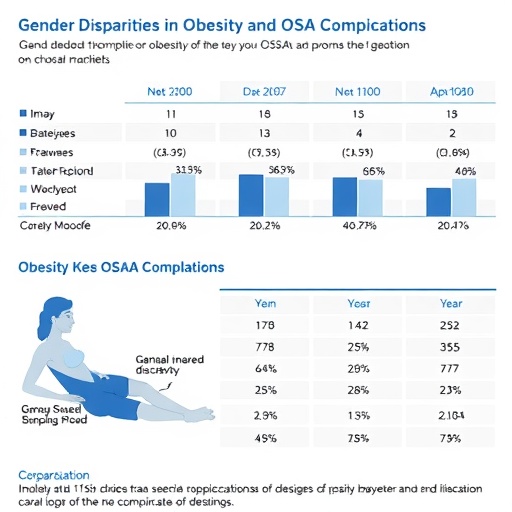Recent research published in Biology of Sex Differences has brought to light the intricate differences between sexes in relation to the endocrine, metabolic, and psychological disturbances experienced by obese patients diagnosed with obstructive sleep apnea (OSA). This study, conducted by Qian, Li, and Ming, emphasizes that the intersection of obesity and OSA is a critical area of concern for public health, particularly considering the rising prevalence of these conditions globally.
Obstructive sleep apnea is characterized by repeated interruptions in breathing during sleep due to the relaxation of throat muscles, which leads to blocked airways. The implications of this condition extend far beyond poor sleep quality, affecting physiological health, mental well-being, and overall mortality rates. The combination of obesity and OSA exacerbates these outcomes, creating a pressing need for tailored interventions that account for sex differences.
The research underscores the notion that men and women experience and respond to OSA differently, influenced by both hormonal and psychosocial factors. For instance, men with OSA often exhibit more prominent metabolic disturbances, such as insulin resistance and altered lipid profiles, compared to their female counterparts. Conversely, women may experience more severe psychological disturbances, leading to higher rates of anxiety and depression associated with OSA-related symptoms.
An area of pivotal focus within the study was the role of hormones in these differences. Testosterone and estrogen have been shown to influence body fat distribution and metabolism, impacting how each sex responds to obesity and sleep apnea. These hormonal disparities could give rise to distinctive pathophysiological mechanisms, making it essential for healthcare professionals to consider sex-specific treatment approaches to optimize outcomes for affected patients.
In addition to hormonal influences, the psychological aspect of OSA cannot be overlooked. The researchers found that the burden of managing OSA symptoms alongside obesity often leads to increased stress levels, particularly among women. The social stigma associated with obesity, coupled with the isolation experienced due to sleep-related issues, can exacerbate feelings of helplessness and anxiety, creating a vicious cycle of psychological disturbance.
Sleep quality considerations also play a fundamental role in how obesity and OSA manifest in both men and women. Poor sleep quality not only aggravates metabolic dysregulation but can also interfere with critical hormonal balance. Sleep fragmentation disrupts the normal release of hormones such as leptin and ghrelin, which are responsible for appetite regulation, further perpetuating weight gain and contributing to the severity of OSA.
Moreover, the study sheds light on the importance of personalized intervention strategies. Understanding the interplay between obesity, sex differences, and OSA can pave the way for more effective treatments that consider these unique variables. Current approaches may benefit from reevaluation to integrate these findings, potentially leading to enhanced therapeutic outcomes and improved quality of life for patients.
As obesity and OSA continue to rise globally, the implications of this research are increasingly urgent. Healthcare systems must adapt to these insights, implementing sex-specific treatment protocols that address the intricate way in which lifestyle factors, biological differences, and mental health are interlinked. Researchers propose more longitudinal studies to further elucidate these relationships and validate the findings, especially regarding the impact of specific therapies on both sexes.
The significance of this study extends beyond academic inquiry; it is crucial for improving clinical practices and refining public health initiatives. By tailoring educational resources and support systems that acknowledge sex differences in OSA management, healthcare providers can better equip patients with tools for successful weight management and effective sleep interventions.
Furthermore, the vital conversation sparked by this research could lead to increased awareness amongst policymakers and health organizations, encouraging them to prioritize obesity and OSA as intertwined public health challenges that demand comprehensive action. Investing in research aimed at understanding these complex dynamics will be key to developing innovative programs that directly address the needs of affected populations.
As we navigate an ever-accelerating obesity epidemic, these findings may serve as a turning point in how we view and approach the intersections of sex, body weight, and sleep disorders. Ultimately, empowering patients with knowledge about their unique circumstances can foster a more engaged approach to treatment, ensuring that the needs of both men and women are adequately met.
The road ahead necessitates ongoing dialogue and collaboration across various disciplines, empowering researchers, clinicians, and policymakers to effectively translate these findings into real-world solutions. With the potential for meaningful impact on the lives of countless individuals, the work of Qian, Li, and Ming is a significant contribution to the field, one that may inspire future studies to continue peeling back the layers on this pressing health issue.
As the body of research in this area expands, it is essential to remain vigilant about the challenges posed by obesity and OSA. The integration of these findings into clinical practices could revolutionize treatment paradigms, ensuring that those suffering from these conditions receive the comprehensive care they deserve. The journey toward understanding sex differences in health is far from complete, but with studies like this, we are taking significant steps in the right direction.
Subject of Research: Sex differences in endocrine, metabolic, and psychological disturbances in obese patients with obstructive sleep apnea.
Article Title: Sex differences in endocrine, metabolic and psychological disturbance in obese patients with OSA.
Article References:
Zi Qian, C., Li, Z., Yi Ming, L. et al. Sex differences in endocrine, metabolic and psychological disturbance in obese patients with OSA. Biol Sex Differ 16, 48 (2025). https://doi.org/10.1186/s13293-025-00730-7
Image Credits: AI Generated
DOI: 10.1186/s13293-025-00730-7
Keywords: Obesity, obstructive sleep apnea, sex differences, endocrine disturbance, metabolic syndrome, psychological health.




